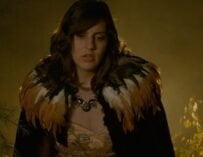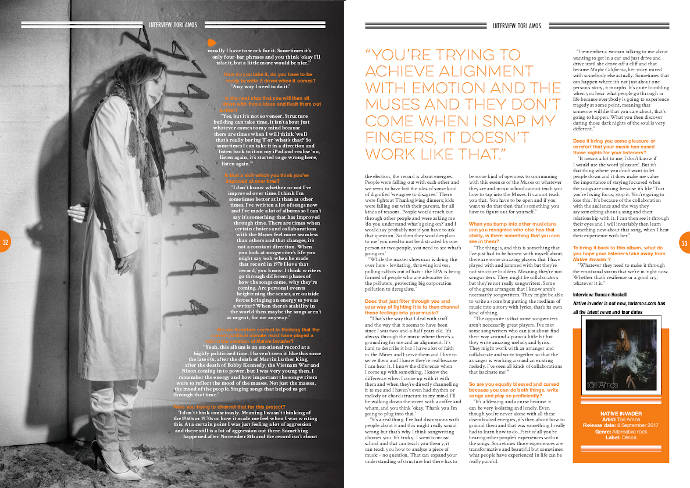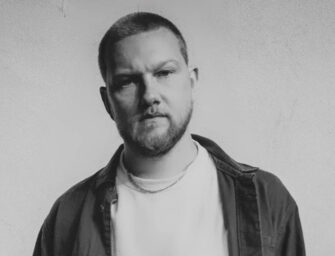Though classically trained, Tori is a musician who has always sought alignment with cosmic forces. We learn a little more about her lifelong quest
Now in her fourth decade in the music industry, the muses have guided Tori Amos from the very start and they have clearly served her well (or perhaps it’s the other way round). Amos’ dynamite piano playing and emotive songwriting have combined to create a consistently engaging and unique back catalogue. Starting with the band Y Kant Tori Read and continuing with solo albums such as Under The Pink, Boys For Pele and recent highlights Night Of The Hunter and Unrepentant Geraldines, her career is testament to respecting the forces of creativity that exist within the ether.
Having recently returned with new album Native Invader, an emotional yet hopeful state of the world address delivered in her own passionate style, we had a chat with Tori to talk about the events which helped shape the record and try to gain a deeper understanding into the role the muses play in her songwriting…
Do you have to be open to every emotion when you’re writing?
“Yes, I do think there’s some truth in that. As you know there are all kinds of different songwriters. There are some songwriters that are interested in more patter songs, to make people laugh, or songwriters whose toolbox is about competing with what’s on the radio in a certain type of style or medium and are chasing that ‘contemporary hit song’ but that is a different skill set to trying to hunt down an elusive emotion and really take the listener to a place where they might make a different decision for themselves that night. I have respect for all the different tools in the songwriting trade but not everybody possesses all of them. I reckon very few do and I think what I do is stylised in a way.”
How does the influence of the muses arrive? Do you wait for them or do you chase them?
“I’ve done it all before and chasing them doesn’t work out so well. You’re trying to achieve alignment with emotion and the muses and they don’t come when I snap my fingers, it doesn’t work like that. Taking pilgrimages to places that might break the routine can shake things up a bit and trigger something that will help them to find me. I could probably write one song a day but then they’d just be songs that nobody would ever want to hear, because it would just be an exercise.”
Was there a specific pilgrimage which inspired this album?
“Yes, to the Smoky Mountains. I went there in July of 2016 and we travelled all around there, a friend of mine and I drove about. It’s a place where my grandfather spent a lot of time, my mother’s father, and I guess I was trying to trace the song lines and find the stories, be with the land and hear those stories that he would talk with me about. That didn’t happen right away, the muses didn’t drop songs on me in the Smokies, it took a little time. It took coming back and spending some time in Florida, seeing my mother and talking with her about my experience there. I was really motivated by being there, it is incredible country and the spirit seemed very real, but it was very quiet. But then the songs really started coming in autumn of last year.”
Can you explain a little more about what happens when a song arrives and how it then takes shape?
“I’m really blessed and feel very fortunate if I get a verse, so when you get a verse and a chorus, oh my goodness, it’s Christmas from the muses because usually I have to work for it. Sometimes it’s only four-bar phrases and you think, ‘Okay I’ll take it, but a little more would be nice.’”
How do you take it, do you have to be ready to write it down when it comes?
“Any way I need to do it.”
Is the next step that you will then sit down with those ideas and flesh them out further?
“Yes, but it’s not so veneer. Structure building can take time, it isn’t about just whatever comes to my mind because there are times when I will think, ‘Well,
that’s really boring,’ or ‘What’s that?’ So sometimes I can take it in a direction and listen back to it on my iPad and realise, ‘No, listen again, it’s started to go wrong here, listen again.’”
Is that a skill which you think you’ve improved at over time?
“I don’t know whether or not I’ve improved over time. I think I’m sometimes better at it than at other times. I’ve written a lot of songs now and I’ve made a lot of albums so I can’t say it’s something that has improved through time. There are times when certain choices and collaborations with the muses feel more seamless than others and that changes, it’s not a constant direction. When you look at songwriter’s life you might say, ‘Ooh when he made that record in 1970 I love that record,’ you know. I think writers go through different phrases of how the songs come, why they’re coming. Are personal events heightening the senses, are outside forces bringing an energy to you as a writer? When there’s stability in the world then maybe the songs aren’t as urgent, for me anyway.”
Are we therefore correct in thinking that the current political climate must have played a role in the creation of Native Invader?
“Yeah, this album is an emotional record. I haven’t seen it like this since the late 60s, after the death of Martin Luther King. Remember the energy and how important the songwriters were to reflect the mood of the masses. Not just the masses, the mood of the people. Singing songs that helped us get through that time.”
Were you trying to channel that for this project?
“I don’t think consciously. Meaning I wasn’t thinking of the 1960s or 1970s or how it made me feel when I was writing this. At a certain point, I was just feeling a lot of aggression and there still is a lot of aggression out there. Something happened after November 8th and the record isn’t about the election, the record is about energies. People were falling out with each other and we seem to have lost the idea of some kind of dignified ‘we agree to disagree.’ There were fights at Thanksgiving dinners; kids were falling out with their parents, for all kinds of reasons. People would reach out through other people and were asking me, ‘Do you understand what’s going on?’ and I would say, ‘Probably not, if you have to ask that question.’ So then they would explain to me, ‘You need to not be distracted by one person or two people, you need to see what’s going on.’
“While the master showman is doing this over here – levitating, throwing knives, pulling rabbits out of hats – the EPA is being formed of people who are advocates for the polluters, protecting big corporation pollution to deregulate.”
Does that just filter through you and your way of fighting it is to then channel those feelings into your music?
“That’s the way that I deal with stuff and the way that it seems to have been since I was two-and-a-half years old. It’s always through the music where there’s a grounding for me and an alignment. It’s hard to describe it but I have a lot of faith in the muses and I serve them and I live to serve them and I know they’re real because I can hear it. I know the difference when I come up with something, I know the difference when I come up with it with them and when they’re directly channelling it to me and I haven’t even had rhythm or melody or chord structure in my mind. I’ll be walking down the street with a coffee and wham, and you think ‘okay. Thank you I’m going to plug into that.’
“It’s a real thing. I’ve had discussions with people about it and this might really sound wrong but that’s why I think songwriting chooses you. It’s tricky, I went to music school and that can teach you theory, it can teach you how to analyse a piece of music – no question. That can expand your understanding of structure but there has to be some kind of openness to communing with this essence of the muses or whatever they are and music school cannot teach you how to tap into the muses. It cannot teach you that. You have to be open and if you want to do that then that’s something you have to figure out for yourself.”
When you bump into other musicians can you recognise who else has that ability, is there something that you can see in them?
“The thing is, and this is something that I’ve just had to be honest with myself about, there are some amazing players that I have played with and jammed with but they’re not structure-builders – meaning they’re not songwriters. They might be collaborators but they’re not really songwriters. Some of the great arrangers that I know aren’t necessarily songwriters. They might be able to write a score but putting the medium of music into a story with lyrics, that’s its own kind of thing.
“The opposite is that some songwriters aren’t necessarily great players. I’ve met some songwriters who can just about find their way around a piano a little bit but they write amazing melody and lyrics. They might work with an arranger and collaborate and write together so that the arranger is working around an existing melody. I’ve seen all kinds of collaborations that fascinate me!’”
So are you equally blessed and cursed because you can do both things, write songs and play so proficiently?
“It’s a blessing and a curse because it can be very isolating and lonely. Even though you’re never alone with all these disembodied energies, it’s then about how to ground them and that was something I really had to learn how to do. First of all, you’re hearing other people’s experiences within the songs. Sometimes those experiences are transformative and beautiful but sometimes what people have experienced in life can be really painful.
“I remember a woman talking to me about wanting to get in a car and just drive and drive until she drove off a cliff and that became Maybe California, her story mixed with somebody else actually. Sometimes that can happen where it’s not just about one person’s story, it morphs. It’s quite humbling when you hear what people go through in life because everybody is going to experience tragedy at some point, meaning that someone will die that you care about, that’s going to happen. What you then discover during those dark nights of the soul is very different.”
Does it bring you some pleasure or comfort that your music has eased those nights for your listeners?
“It means a lot to me, I don’t know if I would use the word ‘pleasure’. But it’s that thing where you don’t want to let people down and it does make me value
the importance of staying focussed when the songs are coming because it’s like ‘Tori you’re losing focus, stop it. You’re going to lose this.’ It’s because of the collaboration with the audience and the way they say something about a song and their relationship with it. I can then see it through their eyes and I will invariably then learn something new about that song, when I hear their experience with her.”
To bring it back to this album, what do you hope your listeners take away from Native Invader?
“Whatever they need to make it through the emotional storm that we’re in right now. Whether that’s resilience or a good cry, whatever it is.”
Interview: Duncan Haskell



































Related Articles